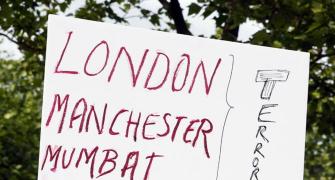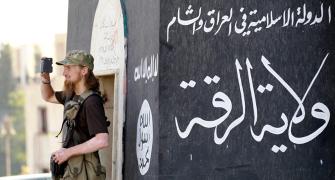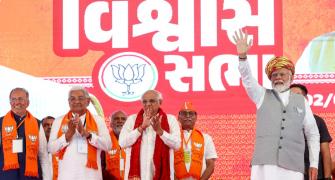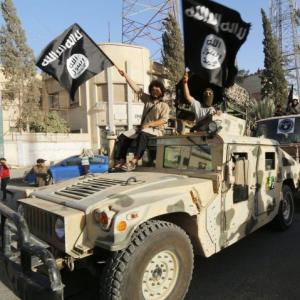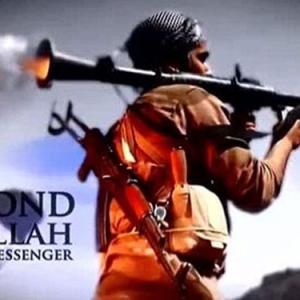In the worst terror attack this year, ISIS terrorists killed 305 Muslims and wounded over a hundred others at a Sufi mosque in Bir al-Abed on Friday, November 24.
'It is important to destroy, to undermine, to debunk the narrative of ISIS,' Olivier Roy -- one of the world's leading experts on radical Islam -- tells Rediff.com's Vaihayasi Pande Daniel in an exclusive interview.
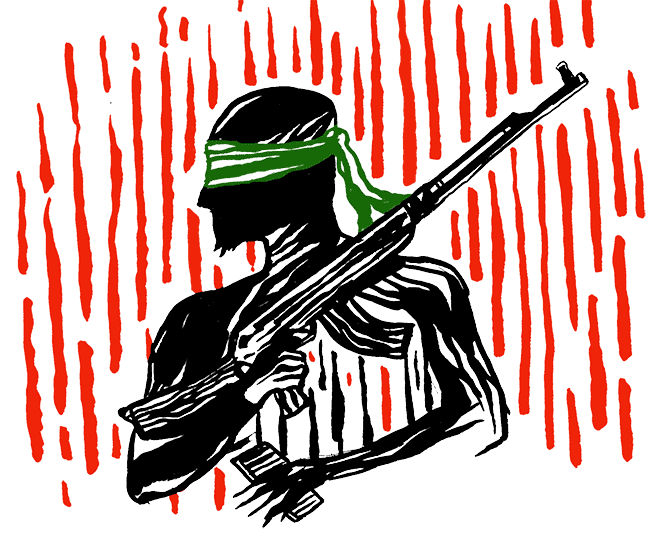
Illustration: Dominic Xavier/Rediff.com
Sydney-born Khaled Sharrouf was just 36 when he was killed in Syria.
Radicalised when he was a teenager, Sharrouf, of Lebanese descent, was charged with his first terrorism-related crime by the time he was 24.
In 2013, he fled Australia with his wife Tara Nettleton and five children to join ISIS in Syria.
Before his death he had a macabre presence on the Internet where he would post photographs of his murderous activities, including an image that shook the world -- of his seven-year-old son gleefully holding up the severed head of a Syrian soldier with the caption: 'That's my boy'.
When Olivier Roy wrote his latest book Jihad and Death: The Global Appeal of Islamic State, which released in April 2017, he profiled ISIS followers, men and women with character sketches extraordinarily similar to Sharrouf's or the recent New York attacker, Sayfullo Saipov.
Most ISIS adherents, like Sharrouf, have been in and out of trouble with the law and are looking for death thrills from a young age.
Evil individuals, whose life narratives, Professor Roy says, have nothing to do with religion, the families that brought them up or their local Muslim community.
Professor Roy contends that young Western Muslims, often finding themselves unmoored in a society their immigrant families do not belong to, are in need of an adapted, modern, Western version of their religion.
Professor at the European University Institute, Florence, Italy, Dr Roy is one of the world's leading authorities on Islam, one of the most radical thinkers on 21st century jihadism. His latest book underlines the premise that the world is presently witnessing 'not the radicalisation of Islam, but the Islamisation of radicalism.'
In a conversation with Rediff.com's Vaihayasi Pande Daniel Professor Roy -- who is fluent in several languages including Persian, and has written more than a dozen books on Islam, the Islamic world, secularism, religion -- discusses where modern global jihadism is headed.
The first of a two-part interview:
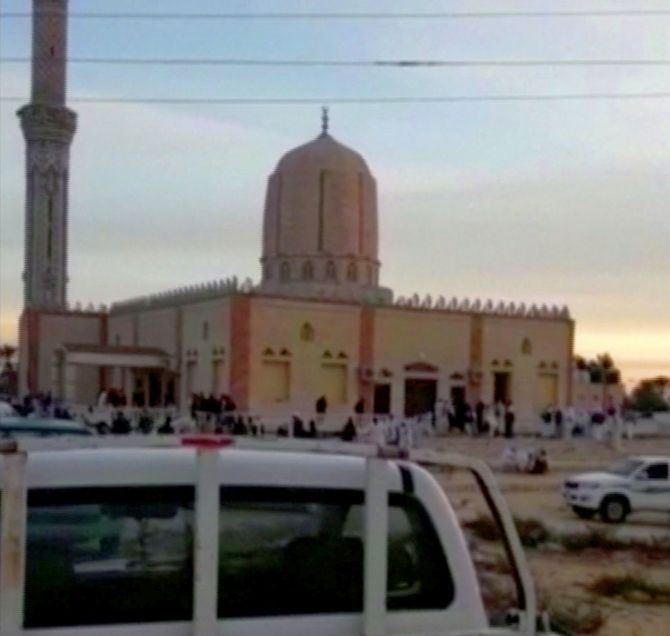
As the worshippers fled, gunmen -- who raised the ISIS flag -- opened fire on them, killing scores of others.
305 people were killed and over 130 injured in the attack, the deadliest in Egypt's history.
The premise of your recent book, Jihad and Death: The Global Appeal of Islamic State, is that the jihadist who commits terrorism in the West does not have a typical Muslim profile.
Further, you believe he doesn't come from the usual Salafi-ised spaces.
Instead you suggest they are usually lapsed Muslims. And they are rebels who choose radicalism and then sort of fit it to an Islamic mould.
How do families and societies stop a young person from becoming an ISIS terrorist?
I would say it depends on the local situation. The big issue is: What is the relation between the terrorist and the Muslim community of their own country.
Particularly if we pick Western Europe or the US, (these) terrorists are on the margins of the local population. They are not part of any political Islamic movement.
They are usually not regular attendants of a specific mosque. They have no real religious past... They were not part of Muslim protest movements... or things like that.
We have 20 to 25 percent of converts (like this, from the local Muslim population of a country). By definition (that is) marginal in comparison with the local Muslim population. So we can say that in Europe and the USA, there is no or little connection between the stakes of the Muslim population and terrorism.
The issue is now how does it work in Muslim countries like Turkey, Tunisia, Egypt, Saudi Arabia, Pakistan. See (that) also is a complex situation.
In Turkey and Tunisia, the terrorists are also on the fringes of the Muslim population. A good indicator of that is the relationship between Islamic terrorists and their parents, their father and mother.
In Tunisia and Turkey, for instance, the families very often -- and I say in the majority of the cases -- the families refuse to bury the bodies of their terrorist sons, which shows that there is clearly a gap between the terrorist and their family.
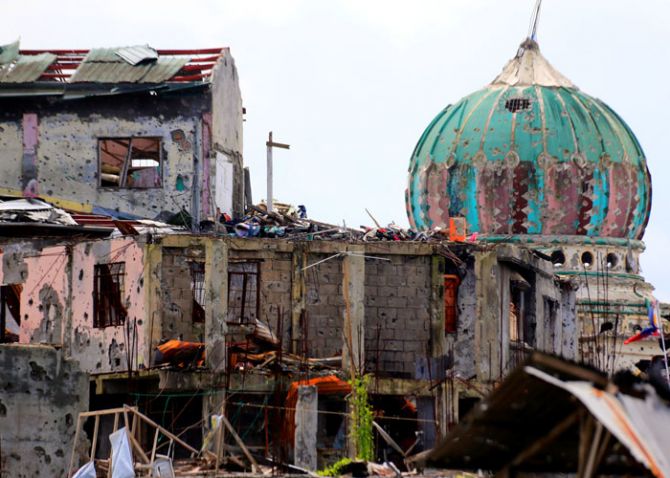
While in Pakistan it doesn't seem to be the case. In Pakistan, the terrorists are part of the radical Islamist parties or organisations like Lashkar-e-Tayiba for instance.
They have contacts with a mosque, with even possibly some societies. They are not marginals (on the fringes). And that is a big difference.
There is genuine social ground for radicalisation in Pakistan, which is very true, for instance, in the Pashtun Khyber areas.
They have (there) a radicalisation of the locals, who are fighting, not just the radicalisation of individuals.
It is also in Punjab, particularly south Punjab. The majority of the radicals come from Punjab. They don't come from Sind or Baluchistan. They come from Punjab.
So clearly there is something here which is specific. There are some social roots for radicalisation.
In India, it is not the case, you know. The terrorists in Bombay (who attacked the city on November 26, 2008), they came from Pakistan. There was no homegrown terrorism. It is not the result of the radicalisation of Indian Muslims.
As you probably know, there was an underground core ISIS cell which had been discovered in Kerala. Most of the people of this radical group were lapsed from Christianity and Hinduism.
It seems that radicalisation in India is along patterns very common with Europe.
While in Pakistan? No. It is connected with the social movements in Pakistan.

But when it comes to the West, how can the conversion of local youth to ISIS be checked? How do you stop them?
It is very difficult to stop people who self radicalise. They are (leading) a normal life and suddenly in the span of one or two years they become radicals...
The problem is (how) to deprive them of the religious legitimacy they give to themselves.
The problem is (how) to undermine the narrative of terrorism that has been forged by ISIS.
They are fascinated by that narrative. The narrative of the lonely soul who dies and goes to paradise, in order to avenge the (suffering of) the global ummah, the Muslim community (Ummah means the global community of Muslims bound together by ties of religion).
(It is important) to destroy, to undermine, to debunk the narrative of ISIS.
For that, yes, there is a necessity to have a normal, Muslim -- I would not say liberal -- religious visibility and legitimacy (in these places).
What is lacking in Europe are legitimate Muslim theologians and imams because the present intellectual level of the imams (there) is quite low.
Most of the institutional expressions of Islam in Europe have gone under the control of (imams from) foreign States, namely Turkey, Morocco and Algeria.
This is a problem, because (though) the Islam of these States is moderate, it does not fit with the European cultural environment.
It is traditional Islam, foreign Islam, and it has little attraction for the youth who have been educated in Europe, who, I would say, share Western youth culture...
These guys are not fascinated by the traditional ulema (views of the recognised international body of Muslim scholars) or imams coming from Turkey, Tunisia, Morocco, Algeria, you know.
They are looking for something which is both Islamic and Western. Modern.
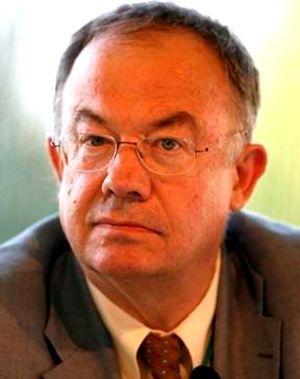
Basically they find that with ISIS!
ISIS is a very modern organisation. They (ISIS) are very professional in terms of video clips, in terms of propaganda, in terms of using the Internet, in terms of using the aesthetic codes of the modern Western youth culture.
So it is why ISIS fascinates young Muslims.
The best way to counter ISIS propaganda is to develop Western Islam. Not to adopt some sort of Oriental moderate Islam because these guys, they are European now.
They are looking for a religion which is adapted, which is ideologically embedded in Western youth culture.
As I said, ISIS provides them with this kind of merging between modern youth culture and Islam.
Of course, it is a very negative form of ideology, but it fits with the nihilistic feeling which is now a big part of the Western youth culture -- the fascination for death, the fascination for killing, the fascination for very violent movies.
If you look at the language of rap music, for instance, if you look at crimes like Columbine (the April 1999 massacre of 13 at a Colorado school by two of its students) when young school children kill their friends and teachers in their own school, which is very common practice now in the USA, then we can conclude that: Yes, there is a problem especially on the part of Western youth.
And ISIS is (playing) on that... To redeem the suicidal young if I can say that.
But mainly, you say, it is an issue of how the mullahs in Western mosques need to get modern to appeal to the youngsters.
Exactly. It is very much a conflict of generations among Muslims in the West.
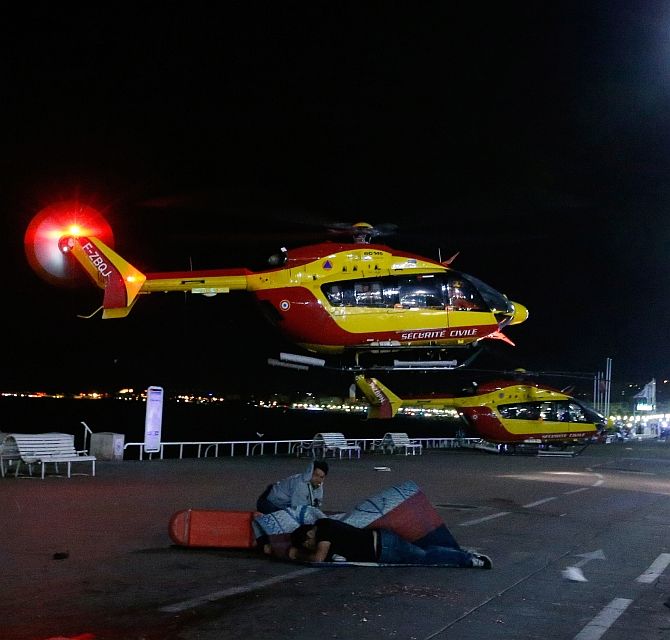
No one talks about a Jewish terrorist or a Christian terrorist committing a crime. But any violent Muslim youngster is immediately a terrorist.
Exactly. Let's take an example. When the German pilot crashed his plane a few years ago and 150 were killed (Andreas Lubitz of Germanwings Flight 9525 on March 24, 2015) it did not make the headlines of the newspaper anymore as soon as it was clear that the guy was not a Muslim.
When we recently an attack in Paris (April 2017) during the election and a British man was killed -- just one man -- then it was a big story, because, of course, the killer said he was killing for ISIS.
If he has an Islamic tag, it is a big story.
If he has no Islamic tag, it is just a killing.
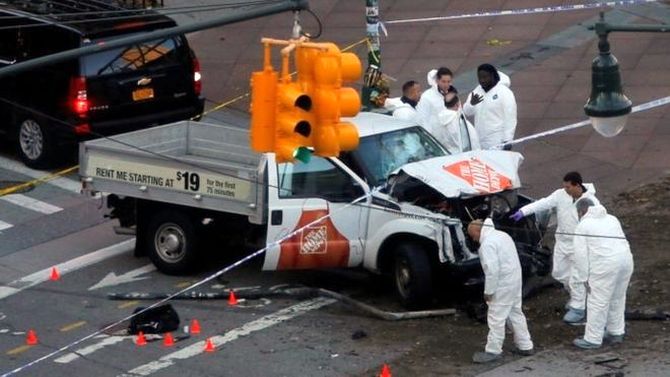
Three young men were responsible for the London attack (June 3, 2017 on London Bridge). Based on your theory, maybe two of them were these death cult types, looking for thrills. But perhaps not the third, Rachid Redouane.
Also, could there be other factors?
You have said it is not alienation, not bullying, not feeling left out or being migrant. But maybe it is a combination of factors?
That there is a bit of all of this that turns them towards terrorism? Like it might have happened for Redouane?
They all claim to act in revenge for the suffering of the Muslim ummah. They all say that.
But almost none of them have experienced suffering as a Muslim. We have very few Palestinians -- very, very few -- among the global terrorists.
We have very few Muslims coming from India. We have several from Great Britain, we have several immigrant Hindus converting to Islam (like ISIS militant Abu Rumaysah al-Britani, who was born Siddhartha Dhar in London and now reportedly in Syria). They have not experienced any kind of persecution.
They live in an imaginary world.
The guys who are really suffering, like in India ... these are not the guys who go for jihad or who justify taking terrorist action.
There is a discrepancy between real life and this kind of imaginary world, where individuals play heroes avenging the sufferings of the ummah.


